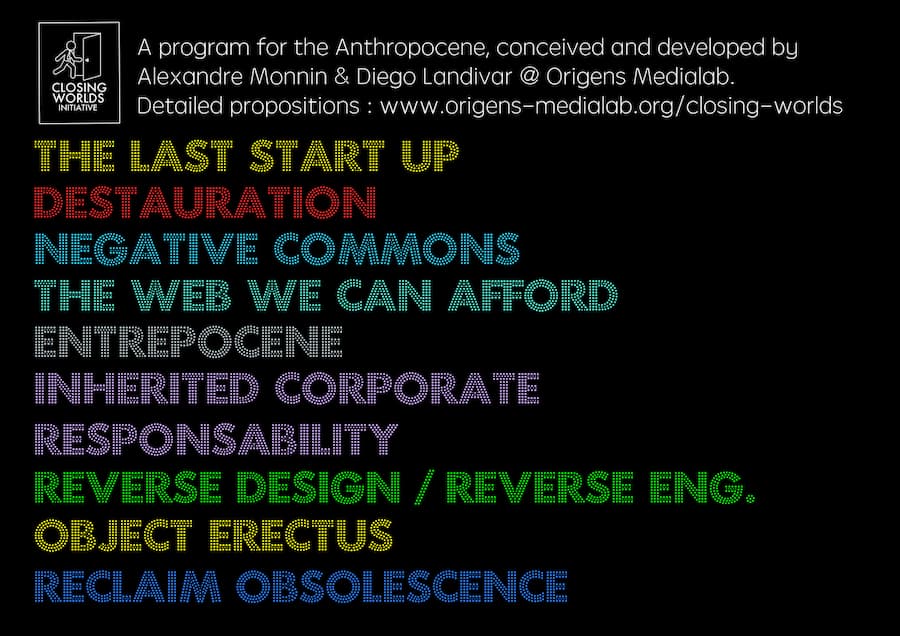
Origens
Origens Media Lab is a research laboratory conceived as an interdisciplinary third place in the humanities and social sciences. Founded in 2010 by Emilie Ramillien and Diego Landivar, Origens was conceived as a space that would allow us to free ourselves from certain institutional constraints that weigh on conventional research institutions (delimited research axes, weak interdisciplinarity, administrative heaviness, financial anxiety, epistemic coldness, short-termism, etc.) and that do not allow to fully embrace all methodological and epistemic possibilities.
Origens investigates the cosmological transformations induced by the Anthropocene by mobilizing methodological frameworks at the crossroads of ethnography, philosophy, sociology and digital humanities. We anchor our approach in an in-depth investigation (in the pragmatic and anthropological sense of the term) that we conduct in various fields (with farmers and peasants, with indigenous communities but also with "modern" organizations such as coporations, with artists or even within the digital fields).
Closing Worlds
Founded in March 2014 by Alexandre Monnin and Diego Landivar, later joined by Emmanuel Bonnet, the Closing Worlds initiative has two main goals. First, to inherit the legacy of the past (the Technosphere, capitalism, etc.). In other words What we call "negative commons", and contrivers to ways of dealing with them since critique will not be sufficient to make them vanish. The second goal is to shift from a paradigm of projection and innovation towards re-embedding the futures inside planetary boundaries, even of the cost of forsaking some of them, and learning "not to make things happen".
cThen Closing Worlds initiative has led to the consolidation of a new concept, that of "Ecological Redirection". Inspired by the work of Australian Designer Tony Fry and by Bruno Latour on the issue of "landing", the concept of Redirection refers to two main ideas:
- The paradigms of Sustainable Development, CSR and Transition no longer allow us to think about the new ecological and climatic situation, which is characterized by an acceleration and a criticality of the problems that have never been seen before.
- The climate and ecological emergency requires an urgent alignment of organizations and companies within planetary boundaries that remains attached to issues of environmental and social justice.
Inquiries conducted (2016-2020):
A) Survey about "collapsed CEOs".
This sociological inquiry aims to analyze the turmoil that some managers, members of boards and decision-makers experience in the face of the diagnoses of the Anthropocene and Climate Change. For this purpose, we have conceived a protocol to allow us to have access, often in confidentiality, to the reactions of these types of actors. By what processes do these top managers become aware of the emergency at hand? What cognitive and conceptual bifurcations do they experience? Within which perimeters can they express their disorder? How do they negotiate their radical perspectives on the environmental situation and their position in the strategic bodies of their organizations? How do they transmit their diagnoses? What tensions, problems and frictions do they encounter within their organizations? Through what kinds of mechanisms (transmission, negotiation, power relations, etc.) do they defend their positions in order to act on the strategy of their organizations? What disruptions of trajectories do such disorders cause in these environments?
B) Investigation of the effects of climate change on the strategy of corporations and public institutions and the habitability of territories.
Climate change is not simply a global phenomenon, but is causing critical ecological situations that threaten economic sectors that depend on ecosystems which are now brink of extinction. This survey allows us to analyze how companies and public organizations react to these upheavals. We are thus investigating : - The disappearance of snow in various French and European territories, leading to financial and legal liquidations in the ski resort sector, or threatening entire sectors of activity closely linked to snow (sports equipment manufacturers, tourism, etc.) - The pressure on natural resources caused by climate change: organizations dependent on fossil fuels or agricultural sectors sensitive to natural disasters (cocoa, corn, etc.). How companies react strategically to these ecological collapses, what transformations on the industrial organization induced, etc. - The way the Anthropocene disrupts the strategic direction of territorial public organizations.C) Investigation of what the Anthropocene is doing to management, steering, analysis and auditing tools in organizations.
The new ecological situation is profoundly challenging traditional management tools (accounting, control, auditing, organizational, etc.) designed to function in an economy of permanent growth and intensive innovation. Faced with the Anthropocene, these management tools not only fail to make the ecological situation understood, but also free up space for creativity to think of new ones.
Areas of intervention and support:
- Design of ecological redirection protocols.
- Design of protocols for relinquishment/reassignment.
- Design of coalitions for ecological redirection.
- Design of new ecological narratives.
- Design of management tools for ecological redirection.
- Various accompaniments to local authorities, municipalities, metropolises or regions.
Press coverage (in French):
- https://www.internetactu.net/2020/02/26/demain-la-derniere-start-up/
- https://usbeketrica.com/fr/article/il-faut-renoncer-aux-futurs-deja-obsoletes
- https://www.pourleco.com/en-vrai/le-futur-aujourdhui/un-avion-neutre-en-carbonne-ca-na-aucun-sens
- https://www.ladn.eu/entreprises-innovantes/redirection-ecologique-business-model-anthropocene-origens-medialab/
- https://www.liberation.fr/terre/2020/06/01/les-entreprises-au-test-de-la-redirection-ecologique_1788746/
- https://www.usinenouvelle.com/article/la-defuturation-c-est-renoncer-a-des-futurs-deja-obsoletes-explique-diego-landivar.N1009869
- https://tikographie.fr/2020/10/le-premier-master-sur-lanthropocene-vient-de-clermont/
- https://www.imagine-magazine.com/libre-acces/decouverte/closing-worlds-ou-comment-penser-le-renoncement/
- https://www.rts.ch/play/radio/tribu/audio/planifier-le-declin?id=11652808
- https://www.welcometothejungle.com/fr/articles/master-anthropocene-repenser-entreprises
- https://tikographie.fr/2021/02/le-master-design-de-lanthropocene-questionne-le-modele-des-stations-de-ski/
- https://home.kpmg/fr/fr/home/campaigns/2020/08/how-innovation/interview-closing-worlds-alexandre-monnin.html
- https://www.prospective-industries.fr/actualite/14-grille-de-lecture-strategique/106-redirection-ecologique-et-croissance-zero-deux-nouveaux-modeles-economiques